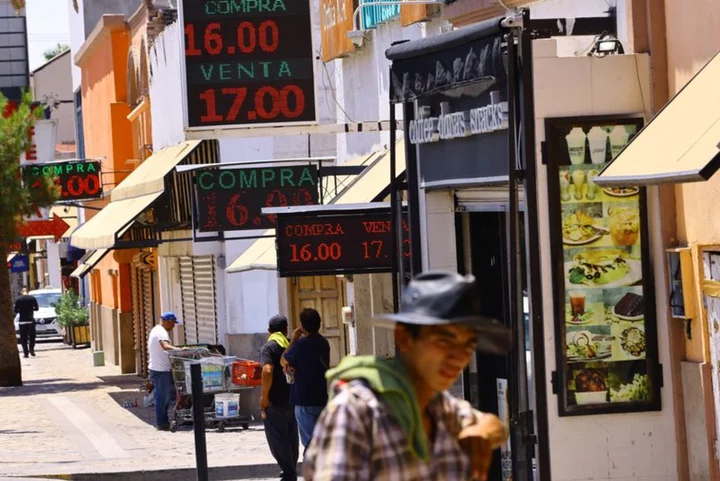By Lizbeth Diaz and Noe Torres
TLAXCALA, Mexico Mexican mother-of-two Adriana Sanchez frets the $300 or so a month her husband sends from the United States will no longer cover family expenses as a sharp appreciation in the peso currency and nagging inflation crimp her budget.
Mexico now takes in nearly $60 billion a year in remittances, mostly from the United States, making them a pillar of household spending in a country that is now one of the biggest beneficiaries of cash transfers worldwide.
But emergence of the phenomenon known as the "super peso" means those dollars no longer go as far as they did.
Lifted by higher central bank interest rates, as well as the relocation of manufacturing capacity to the region from Asia - a trend known as nearshoring - the peso has risen by over 14% against the dollar this year, outperforming international peers.
The 39-year-old Sanchez, who lives in the central city of Tlaxcala east of Mexico City, said she recently tightened her purse strings: she does not go out with her children as much, and buys less meat for the family.
"As much as I try to stretch (the money), it's not enough now," she said, worrying about how she will provide for her children in the coming school year.
HITTING LOW-INCOME FAMILIES
A year ago, the currency was trading at around 20.40 pesos per dollar. On Friday, it hit a 7 1/2-year high to trade at 16.63 pesos per dollar.
President Andres Manuel Lopez Obrador has plowed billions of extra dollars into social support programs and urged his compatriots to keep sending greenbacks to Mexico, helping make consumer spending a bulwark of growth since the pandemic ended.
But pressure on remittances will squeeze poorer households.
"The purchasing power of remittances has deteriorated due to peso appreciation," said Carlos Serrano, chief economist at bank BBVA Mexico. "You can see it hitting lower-income families ... in states that bring in most remittances."
The economy grew by 3.1% last year, and while a slowdown is expected, hopes are rising it could get close to matching that performance this year.
Growth stalled in May, because a lackluster service sector - which encompasses the bulk of domestic demand - dragged down the economy, data showed last week.
INFLATION
Remittances to Mexico are heading for another record year, though they are no longer growing as quickly.
The transfers rose 13.4% last year to $58.5 billion. Over the January-May period, that growth slowed to 10.3%.
The fact that remittances continue to rise suggests some Mexicans are sending more to offset inflation, said Pablo Lopez Sarabia, an economist at Tecnologico de Monterrey university.
Headline inflation reached 8.7% last summer and has now slowed to almost half that level. But core inflation is running two percentage points higher, and the central bank has kept interest rates above 11%, putting pressure on borrowers.
Inflation is also making life tougher for Mexicans in the U.S.
Manuel, a 42-year-old cleaner in California, said he used to send home $100 per week. But since the rent on the room he shares with two others went up, he can only manage $70-$80.
"What more can you ask for than to look after your family," he said. "But there's not always work here, and less so for those of us who don't have papers."
By contrast, Veronica, a 45-year-old shopworker in California, said she used to send her family in Tlaxcala $100 a week, but is now sending an extra $40 or so to help them cope.
"They're not asking for more, but everything has gone up in Mexico, and they can't make ends meet any more," she said.
Even those with significantly more money coming in are feeling the pinch.
Georgina Cardenas, 34, said the $1,200 a month she receives from her builder husband in the United States "used to be enough for my two children" and other expenses. "But not anymore."
(Reporting by Lizbeth Diaz and Noe Torres; Editing by Dave Graham and Aurora Ellis)

